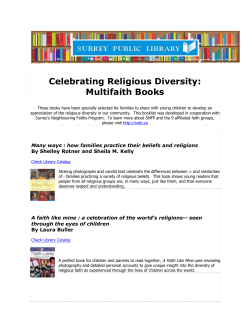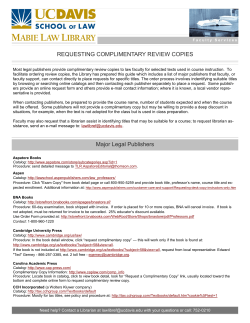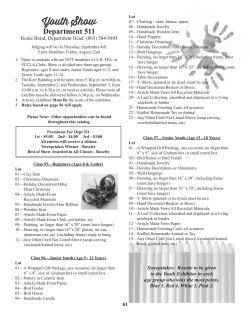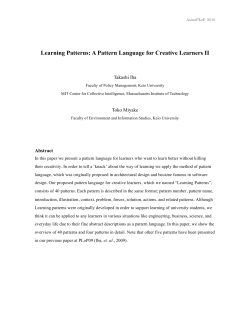
How to Catalog Karamanlidika Works? Bibliographic
How to Catalog Karamanlidika Works? Bibliographic Description of One of the Indigenous Literatures from Academic Library Online Catalogs Karamanlıca Eserleri Nasıl Kataloglamalıyız? Çevrimiçi Kütüphane Kataloglarından Bibliyografik Kayıt Örnekleri Selenay Aytaç Işık University Library, Istanbul, Turkey; Long Island University, NY USA selenay.aytac@gmail.com Değişen Dünyada Bilgi Yönetimi Sempozyumu 26 Ekim 2007, Ankara 1 The Purpose of the Study This study addresses the current problems with cataloging and classification of Karamanli (Karamanlidika) works, and seeks to provide guidance on how to improve existing bibliographic records of these unique works Aytac, S.(2007). How to Catalog Karamanlidika Works? 2 What is Karamanlidika or Karamanlıca ? The Karamanli works, also known as Karamanlidika, refer to those works written in Turkish language but printed in Greek characters according to the usage of Karamanli language or Karamania in Asia Minor (Anatoli) during the Ottoman Empire. Despite the fact that the official government language was Ottoman Turkish written in Arabic script, the Anatolian Orthodox Christian community (also known as Turkish speaking Orthodox people) published many works in Karamanlidika Aytac, S.(2007). How to Catalog Karamanlidika Works? 3 Aytac, S.(2007). How to Catalog Karamanlidika Works? 4 Figure 1. An example of a Karamanlidika Figure 2. Figure 1.1. Macro focus on work: Yeni Sevdalı Şarkı (Courtesy of “Recebim Şarkısı” Professor Evangelia Balta from her work Karamanlidika, 1997) Aytac, S.(2007). How to Catalog Karamanlidika Works? 5 Aytac, S.(2007). How to Catalog Karamanlidika Works? 6 Aytac, S.(2007). How to Catalog Karamanlidika Works? 7 “The Contacts between Languages Reflect the Contacts between Peoples and Cultures.” Matthias Kappler (2002) pointed out that “no individual is perfectly monolingual, no society is purely monocultural, [and] no human expression of art or communication is free from external influence” Works that were published in Ottoman Turkish using Greek script are called Karamanlidika or Karamanli Turkish. This reveals another crosscultural concern for these two languages Aytac, S.(2007). How to Catalog Karamanlidika Works? 8 Works published as a representative of the Karamanli literature was dispersed to all over the world in a variety of libraries and repositories However, neither any members of this multilingual and multicultural community ( Karamanli) exist anymore (the only evidence of their previous existence is the work they produced), nor does Ottoman Turkish or Karamanli language. 9 Methodology Qualitative content analysis was conducted to collect data from library online catalogs WorldCat catalog was searched to retrieve bibliographic records of Karamanli works by using keywords: “Karamanlı” “Karamanli” “Karamanlidika” or Karamanlidhika”. Aytac, S.(2007). How to Catalog Karamanlidika Works? 10 Below Library Opacs were analyzed for the bibliographic descriptions of Karamanli works or the manifestations of Karamanlidika WorldCat Library of Congress Dumbarton Oaks Research Library National Library of Turkey Bogazici University Library (TR) Oxford University Library (UK) Ohio State University Brown University Library University of Michigan 11 A MARC record from Bogazici University Library LEADER 00000cam 2200000 a 4500 008 050222s1894 gr 000 0 gre d 040 BGZ 049 BGZA 090 050 PQ2366.M77|bT9 1894 092 843.8-M76T-1894-Rare 100 1 Montépin, Xavier de,|d1826?-1902. 245 10 Tzinkiane Kizi /|cyayet meshur fetzi ve merakli roman oloup moutevefa pederimiz Evaggelinos Misailidis tarafından tarafindan terdzeme olounmousdir 260 Dersaadet :|bAnatoli Matpaasından,|c1894. 300 1003 p. ;|c23 cm. 650 0 French fiction. 650 0 Turkish language|xKaramanlı. 700 1 Misa¯elid¯es, Euangelinos,|d1820-1890. Aytac, S.(2007). How to Catalog Karamanlidika Works? 12 Aytac, S.(2007). How to Catalog Karamanlidika Works? 13 Aytac, S.(2007). How to Catalog Karamanlidika Works? 14 Findings Results show that published works representing of the Karamanli literature are dispersed all over the world in a variety of libraries and repositories Due to the lack of subject headings and Library of Congress call numbers, retrieving Karamanli works from library catalogs is very problematic There is no specific bibliographic description used for any of these Karamanli works in most of the aforementioned library catalogs, besides the “notes” area of the bibliographic records Aytac, S.(2007). How to Catalog Karamanlidika Works? 15 Recommendation I A new ISO639-2 language code, “krm” for Turkish Karamanli, is recommended for the Karamanli language. This should be added to the ISO639-2 code list. Karamanli Turkish= “krm” Aytac, S.(2007). How to Catalog Karamanlidika Works? 16 Recommendation II A new Library of Congress Subject Heading for Karamanli Literature and LCCN, is recommended for the works written in Karamanli language. This should be added to the LCSH to precisely describe the literature. Karamanli Literature (UF Karamanlidika) Use this subject heading for the Turkish books written in Greek alphabet. Aytac, S.(2007). How to Catalog Karamanlidika Works? 17 Recommendation III Digitization of these unique Karamanli works from this multilingual era will contribute to cultural and scientific research on the World Wide Web. It will also contribute to the preservation of cultural diversity and multilingualism by fostering cross-cultural communication amongst these two countries: Turkey and Greece. Aytac, S.(2007). How to Catalog Karamanlidika Works? 18 Recommendation IV A new ALA-LC Romanization table for Karamanlidika Although Karamanli Turkish is written with mutated form of Greek script, the ALA-LC Romanization table for Greek script (also for Coptic) is not very appropriate in terms of Romanization of these works. For example, Karamanli Turkish uses some special dots on the Greek characters often such as dotted pi and tau, as well as iota. Aytac, S.(2007). How to Catalog Karamanlidika Works? 19 Conclusion Karamanli bibliographic records reveal great examples of the complexities associated with bibliographic relationships in terms of manifestations or derivations of the original work in Turkish language with the mutated Greek script. Our paper aims to raise some awareness of these precious Karamanli collections which are currently sealed in their caves, and recommends a worldwide Karamanli literature Appreciation Week. Aytac, S.(2007). How to Catalog Karamanlidika Works? 20
© Copyright 2025











